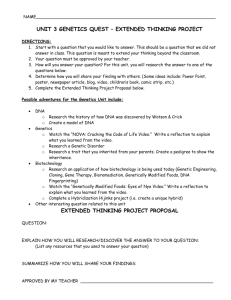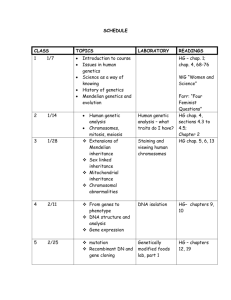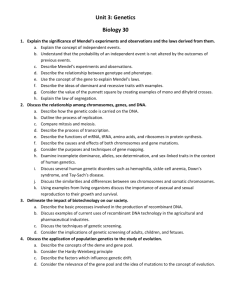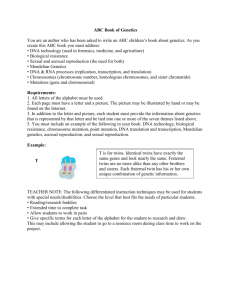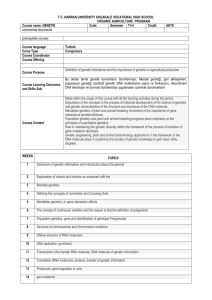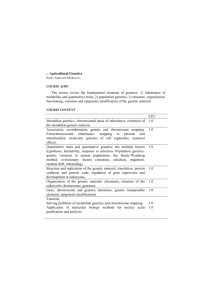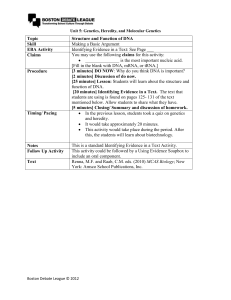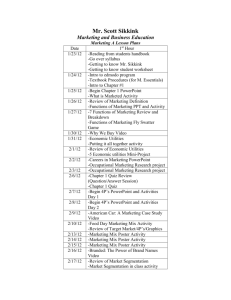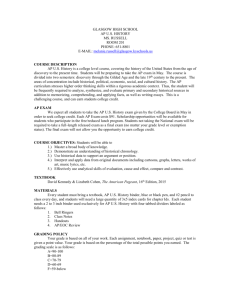Genetics Syllabus – Ms. Alagala
advertisement
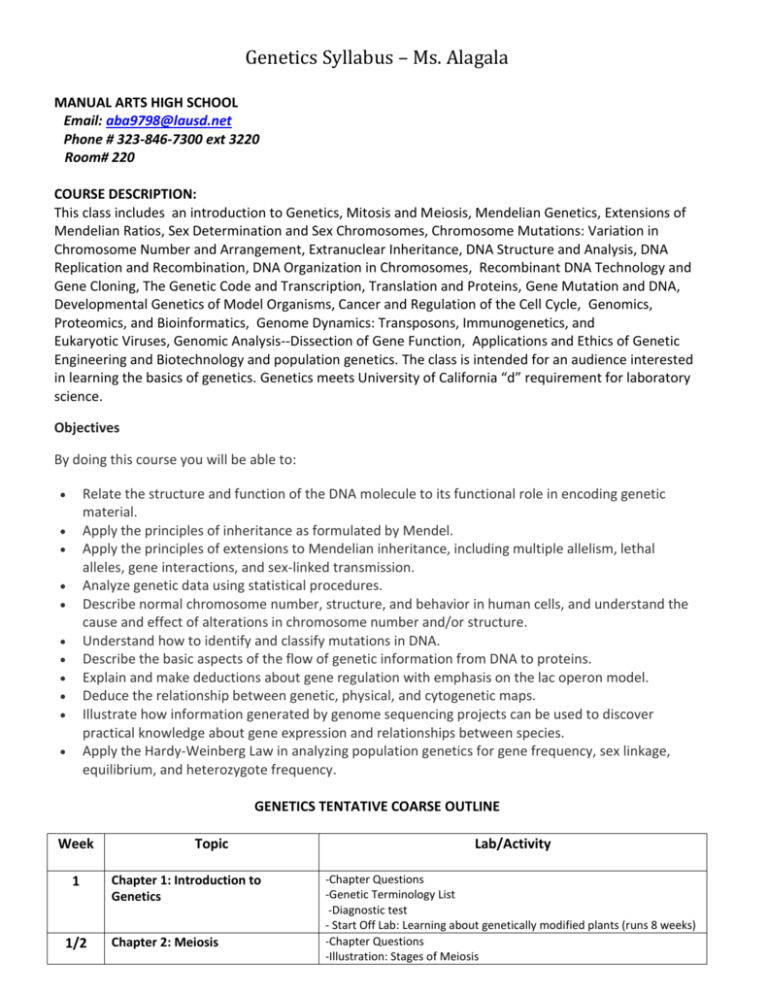
Genetics Syllabus – Ms. Alagala MANUAL ARTS HIGH SCHOOL Email: aba9798@lausd.net Phone # 323-846-7300 ext 3220 Room# 220 COURSE DESCRIPTION: This class includes an introduction to Genetics, Mitosis and Meiosis, Mendelian Genetics, Extensions of Mendelian Ratios, Sex Determination and Sex Chromosomes, Chromosome Mutations: Variation in Chromosome Number and Arrangement, Extranuclear Inheritance, DNA Structure and Analysis, DNA Replication and Recombination, DNA Organization in Chromosomes, Recombinant DNA Technology and Gene Cloning, The Genetic Code and Transcription, Translation and Proteins, Gene Mutation and DNA, Developmental Genetics of Model Organisms, Cancer and Regulation of the Cell Cycle, Genomics, Proteomics, and Bioinformatics, Genome Dynamics: Transposons, Immunogenetics, and Eukaryotic Viruses, Genomic Analysis--Dissection of Gene Function, Applications and Ethics of Genetic Engineering and Biotechnology and population genetics. The class is intended for an audience interested in learning the basics of genetics. Genetics meets University of California “d” requirement for laboratory science. Objectives By doing this course you will be able to: Relate the structure and function of the DNA molecule to its functional role in encoding genetic material. Apply the principles of inheritance as formulated by Mendel. Apply the principles of extensions to Mendelian inheritance, including multiple allelism, lethal alleles, gene interactions, and sex-linked transmission. Analyze genetic data using statistical procedures. Describe normal chromosome number, structure, and behavior in human cells, and understand the cause and effect of alterations in chromosome number and/or structure. Understand how to identify and classify mutations in DNA. Describe the basic aspects of the flow of genetic information from DNA to proteins. Explain and make deductions about gene regulation with emphasis on the lac operon model. Deduce the relationship between genetic, physical, and cytogenetic maps. Illustrate how information generated by genome sequencing projects can be used to discover practical knowledge about gene expression and relationships between species. Apply the Hardy-Weinberg Law in analyzing population genetics for gene frequency, sex linkage, equilibrium, and heterozygote frequency. GENETICS TENTATIVE COARSE OUTLINE Week 1 1/2 Topic Chapter 1: Introduction to Genetics Chapter 2: Meiosis Lab/Activity -Chapter Questions -Genetic Terminology List -Diagnostic test - Start Off Lab: Learning about genetically modified plants (runs 8 weeks) -Chapter Questions -Illustration: Stages of Meiosis Genetics Syllabus – Ms. Alagala 2 Chapter 3: Mendelian Genetics 3 Chapter 4: Extension of Mendelian Genetics 4 Chapter 7: Sex Determination and Sex Chromosome 5 Chapter 8: Chromosome Mutations: Variation in Chromosome Number and Arrangement 6 Chapter 13: Recombinant DNA Technology and Gene Cloning 7 Chapter 20: Cancer and Regulation of the Cell Cycle 8 Review for FINAL -Lab: Ascaris identification of meiosis stages under a microscope -Quiz: Meiosis -Chapter Questions -Unit 2 Lab 2: Closer Look at Genes and Probability -Activity1: Applying the Law of Chance to Genetics -Activity 2: Modeling a Genetic Cross to Demonstrate the Law of Dominance - Activity3: Modeling a Genetic Cross to Demonstrate the Law of Incomplete Dominance - Chapter Test -Chapter Questions -Human Genetics and Inheritance -Lab: Determining Blood Type -Unit 3 Lab 4 Heredity of Humans -Activity 1: Determine Frequency of Human Traits -Activity 2: Calculating the frequency of Human Traits in a Population -Lab: What Do you Taste? -Chapter Test -Chapter Questions - Project: A Family Portrait (Pedigree) - Activity: Analyzing Karyotypes - Project: Inquiry Investigation Learning to become a genetic detective -Extra Spicy Problems # 30 and 31 -Chapter test -Chapter Questions -Activity: Constructing and Analyzing Karyotypes -Project: Case Studies in Genetics -Extra-Spicy Problems # 24, 29, 31 -Chapter Test -Chapter Questions -Lab: Do onions have DNA? -Activity 1: Analyzing Genetic Origins through DNA fingerprinting -Activity 2: Analyzing Genetic Origins through DNA sequencing -Activity 3: Understanding the Human Genome -Lab: Learning about genetically modified plants -Chapter Test -Chapter Questions -Activity 4: Diagnosing Genetic Diseases -Activity 5: Predicting Genetic Disease -Unit 4 Lab 7: Culminating Lab -Chapter Test -Practice Problems - Sample Test -Cumulative Exam This sheet outlines the requirements necessary for successful completion of the course. A successful completion is a grade of CSS or better. (Required for High School Graduation) IMPORTANT POLICIES: Graded work WILL be maintained in a composition book. Since Physiology is a laboratory class, if the student behaves unsatisfactory, they will not be permitted to do labs till a parent conference is had. There is a zero tolerance on plagiarized/copied work. Make up work policy: Excellent attendance is recommended to succeed in this course. If student has an excused absence (#1 or #2) make up work will be given to the student in the form of an alternate assignment. The work must be submitted in a timely manner (2 days after work is given). NO late work accepted. Genetics Syllabus – Ms. Alagala Late enrollees: Students who enroll late and do not come in with a grade are responsible for all work previous to their enrollment. The students must ask and obtain the work from teacher and appropriate time will be allotted for the completion of work. If student chooses not to ask and do the work, they will only get half credit, 50% which is an F on the assignments. Material needed: 1. Composition book (REQUIRED) 4. Ruler 2. Color pencils 5. Pens/Pencils 3. Glue sticks 6. Pencil Sharpener There are glue sticks, color pencils, rulers, and pencil sharpener in class that is shared equipment provided by the teacher. Student Academic Responsibilities and Expectations. Students will 1. be engaged by scientific questions. 2. explore ideas through direct, hands- on investigations that emphasize observation, solve problems, formulate and test explanations, and create and discuss explanations for what they have observed. 3. analyze and interpret data they have collected, synthesize their ideas, and build concepts and new models with the support of their teacher. 4. apply their new understanding to new settings including real life situations to elaborate on their new knowledge. 5. with their teacher, review and assess what they have learned, and evaluate their understanding. Student Behavior Expectations Students will 1. come to class prepared (writing utensils/ paper, notebooks) 2. be in their seat and ready to start work before the tardy bell rings. 3. have the habits, and attitudes to ensure respect. 4. follow the school’s uniform policy. (no caps or beanies are to be used in class) 5. follow the district and school’s policy on the use of electronic devices in class. ( no device use) 6. keep classes clean by discarding gum, food and beverages before entering class. 7. do any personal grooming before or after class. GRADING CRITERIA: (Tentative) Grading Policies Categories and Category Weight Classwork: 20% Homework: 10% Projects: 15% Tests/Quizzes: 25% Midterm/Final: 15% Labs: 15% Grades: 90%-100% A 80%-89% B 65%-79% C 0%-64% F You earn your grades. Grade sheet will be given every other Tuesday and has to be turned in with parent’s signature the next day. Or grade will be emailed and a parent signature in the notebook acknowledges for looking at the grades on line and be accountable and knowledgeable about child’s grade. WORK HABITS AND COOPERATION: According to Los Angeles Unified School District Criteria. NOTE: Genetics Syllabus – Ms. Alagala 1. Plagiarism in any form is unethical and will not be tolerated. Consequences of plagiarism may result in a failing grade for the course. 2. Any student in this course who has a disability that may prevent them from fully demonstrating their abilities should contact the instructor personally as soon as possible to discuss any accommodations needed to ensure maximal participation and facilitate equal educational opportunity. 3. Students are responsible for conducting themselves with honor and integrity in fulfilling course requirements. Disciplinary proceedings may be initiated by the teacher against a student accused of scholastic dishonesty. Penalties include a grade of "0" or "F" on the particular assignment. Scholastic dishonesty includes, but is not limited to, cheating on a test, plagiarism, and collusion (conspiracy). 4. If you do not understand a topic please ask questions to improve your comprehension. Make sure to ask questions during class or see me after class if you are having problems with the class work. Don’t wait until last minute to get help! During discussions remember to respect the opinions and questions of other students. ACADEMIC SUPPORT: b. Use only your fingers on the keys c. Keep hands off the monitor a. Tutoring available: Room#220 unless it is a touchscreen. Time: 7:00 am – 8:00 am. Or d. Keep your hands clean. After school by appointment e. Do not touch anyone else’s Computer Usage in Classroom: computer. 1. No food, drink, or magnets of any kind is around 7. If anything isn’t working properly let the computers teacher know. 2. Respect each other and the equipment. 8. Do not personalize computers! a. Gentle use of keyboard, mouse, and head a. Do not change monitor phones. backgrounds or screen savers. 3. Do not install or download any software from b. Do not add, move, change or the internet or any other source. delete desktop icons. 4. Listen to teacher during class and Do Not http://www.bluevalleyk12.org/education distract or disturb others with “non-work” /components/scrapbook/default.php?sectiondetailid=42321 activities! 5. NO off-task internet usage! a. Access the internet only with teacher approval. b. Computer usage is only for educational approved/supplied sites for information, image retrieval & interactive learning. 6. Print with permission ONLY! a. Make sure you only print 1 copy. Genetics Syllabus – Ms. Alagala PARENT AND STUDENT STATEMENT: I have understood Ms. Alagala’s Physiology Course Syllabus and agree to all the information typed above. I and parent acknowledge the statement by signing below. Student Name:____________________________________________ Period #______ Email Address:____________________________________________ Student Signature: _______________________________ Date: ________ HOW PARENTS CAN HELP: • Provide your child space to study and make sure lie/she completes assignments on time. • Encourage your child to think about educational and career goals and discuss how specific coursework will assist in achieving them. • Become involved in various educational activities and other programs to learn about the instructional and curricular programs at school. • Recognize your child’s academic achievements and accomplishments in school activities. • Communicate with your child’s teachers, counselor, and other school staff on a regular basis. Attend parentteacher conferences and obtain provided information on school activities. Call Number (323) 846-7301 • Contact Parent Resource Number at (800) 933-8133. I have understood Ms. Alagala’s syllabus and expectation for my child to pass this class. It is my (parent or guardian) responsibility to make space for the child to complete homework and contact teacher whenever necessary. Parent Name: _______________________________________________ Email Address:________________________________________________ Parent Signature:_____________________________________________Date:______________ Phone Number: (1) __________________________________________2)_____________________________________ READ ALL ABOUT ME! 1. What name do you prefer that you be called? ________________ 2. What are your hobbies or things that you enjoy doing? _______________________________________________________________________________ 3. What is your favorite subject and why? _____________________________________________________ _______________________________________________________________________________________ _______________________________________________________________________________________ 4. What is your least favorite subject and why? Genetics Syllabus – Ms. Alagala _______________________________________________________________________________________ _______________________________________________________________________________________ _______________________________________________________________________________________ 5. What are you nervous about for this school year? _______________________________________________________________________________________ _______________________________________________________________________________________ _______________________________________________________________________________________ 6. What do you want your teacher to know about you? _______________________________________________________________________________________ _______________________________________________________________________________________ _______________________________________________________________________________________ 7. Do you have difficulty doing homework? Explain. _______________________________________________________________________________________ _______________________________________________________________________________________ _______________________________________________________________________________________ 8. When you grow up, what would like to be? _______________________________________________________________________________________ 9. What is your academic goal in this class? ______________________________________________________________________________________ _______________________________________________________________________________________ 10. How are you going to achieve this academic goal? ______________________________________________________________________________________ ______________________________________________________________________________________ ______________________________________________________________________________________ 11. What are your few favorite things! a. Color: ___________________________ f. Animal: __________________________ b. Food: ____________________________ g. Book: ____________________________ c. Sport: ____________________________ h. Flower: ___________________________ d. Things to do in School: __________________________________________________________________ e. Things to do at home: ___________________________________________________________________ 12. Anything else, you want Ms. Alagala to know about you? _______________________________________________________________________________________ _______________________________________________________________________________________ _______________________________________________________________________________________ ______________________________________________________________________________________ 13. Draw and name something inside the box that represents you.
